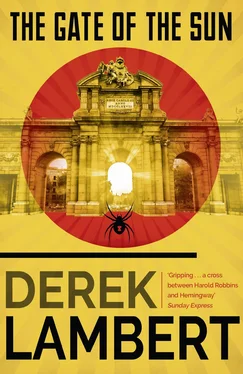February 1937.
Chimo, philosopher, legionnaire and murderer, said, ‘What are you thinking about, Amado?’
Adam Fleming, sheltering in a slit trench from rain and bullets, said, ‘England.’
‘More than that, Amado – you sighed.’ Chimo was an authority on untruths and half-truths because they came readily to his own lips.
‘Why do you call me Amado? My name is Adam. Why not Adamo?’
‘You are Amado. That is you. Were you perhaps thinking about a woman?’ Chimo was an authority on women, too.
‘I was thinking about my sister.’
This troubled Chimo. He massaged his jagged teeth with one finger and the red tassel on his gorillo cap trembled with his anxiety. Finally, he said, ‘But you sighed.’
‘My sister is in Madrid …’
‘She isn’t a red?’ Chimo, brushing raindrops from his abundant moustache, looked apprehensively at Adam through monkey-brown eyes.
‘No, Chimo, she is not a red.’
‘Then to be in Madrid is bad. Very bad. They are starving there. And if we cut the road to Valencia on the other side of the Jarama river then hunger will make them surrender and there will be a great killing.’
‘Were you there when we attacked Madrid?’ Adam asked. He had arrived in Spain last November but he had been too late to take part in the attack which Franco had called off on the 23rd, laying siege to the city instead.
‘I was there,’ Chimo said. ‘They fought like devils, the reds. Particularly the women. Ah, those women, fiercer than the Moors. Those Madrileños, those cats … You have to admire them. Abandoned by their Government who ran off to Valencia, fighting with 50-year-old Swiss rifles, antique weapons taken from the museums … But they were good in the streets, those cats, not like our Moors who are good in open spaces, in deserts …’
‘I heard there was a lot of killing in the city before we attacked.’
‘I heard that, too. Mola and his Fifth Column! Obvious, wasn’t it, that the reds would seek them out and kill them. I hear they took a thousand from the Model Prison and shot them a few miles from Barajas airport. Killing has become a pastime in Spain,’ Chimo said.
‘I hear that Franco could have taken Madrid if he hadn’t decided to relieve Moscardó, at Toledo. I hear,’ Adam said carefully, ‘that Franco doesn’t want to win the war too quickly. He doesn’t want to rule a people who are still full of spirit.’
‘You will hear many things,’ Chimo told him. ‘Every Spaniard is a politician.’
A shell fired from the Republican lines on the far bank of the Jarama, south of Madrid, slurred through the rain digging a crater 50 metres in front of the trench and showering their grey-green campaign tunics with mud.
‘Sons of whores,’ Chimo said. ‘Red pigs. That was the first. The second lands behind us. The third …’
‘I know about range-finding,’ Adam said. He had acquitted himself reasonably well in the cadet corps at Epsom College at everything except rolling puttees round his calves.
‘… lands here. With our name on it.’
Rain bounced on the lip of the trench and fell soggily onto the brown blankets covering their guns; Adam wondered if it would drown the lice; he doubted it – they were survivors.
Chimo said, ‘Tell me, Amado, what are you, an Englishman, doing in this trench waiting for the third shell?’
‘What are you doing, Chimo?’
‘I am a legionario .’
‘What are you fighting for, peace?’
‘Peace?’ The tassel on his cap quivered. ‘Peace is the enemy of the soldier.’
‘How old are you, Chimo?’
‘Nearly 27.’
‘A veteran!’
‘And you, inglés? ’
‘Twenty-one,’ Adam said. A confession.
‘And what are you fighting for?’
‘Ideals,’ Adam said, silencing Chimo who was an authority on many things but a stranger to ideals.
Ideals, too, were self-effacing at Epsom College unless, that is, they were represented by the gods of sport, although there were outposts in that mellow-bricked academy where learning ran a close second to rugby and cricket.
Adam was sent to Epsom, close to the race-track, the home of the Derby, because his mother wished him to be a doctor and the college was renowned for its contributions to medicine.
It was at Epsom that Adam first became aware that his character was seamed with perversity. What he objected to, he subsequently decided, was the attempt to inscribe privilege on pubescent souls. To achieve this many enlightened disciplines were invoked. Games were compulsory unless a medical certificate was produced; such a document was viewed as evidence of weakness and its possessor was consigned to the company of other failures. Crimes were punished by headmaster or housemaster with a cane; misdemeanours by prefects with a slipper and they never shirked their responsibilities. Meals were passed from seniors to juniors along tables the length of the hall, any remotely digestible morsels being removed en route so that the smallest diners were given incentive to rise through the ranks to the heights where the food, although still largely indigestible, was at least warm. A chaplain boomed prayers at 8.40 every morning; modest homosexual practices were not severely discouraged because they were a natural adjunct of puberty and a necessary preparation for the rigours of heterosexual intercourse that lay ahead.
Adam invoked the wrath of both masters and boys not because he was one of the runts of the herd but because he seemed constructed to become one of its leaders. He wasn’t tall but his muscles were long and sinuously sheathed, his expression was secretive, and his hair was black and careless and widow-peaked.
So what did he do? He refused to shove in the scrum; he played tennis, a highly suspect sport; he smoked State Express 555 in a hollow on Epsom Downs while the rest of the house made panting cross-country runs around the frost-sparkling racecourse; and, unforgivably, he read. Inevitably such transgressions brought about retribution. But again he broke the character-moulding rules that decreed that you endured cane or slipper with stoicism: he howled and yelled until the punishment was curtailed; then he rose, dry-eyed, and grinned at his tormentor.
At the end of his first year he told his mother that he had no intention of becoming a doctor. And God help the ailing population of Great Britain, he added, if any of his fellow inmates ever got a scalpel in their hands. His father, home from the City that evening and smelling slightly of whisky, was summoned but, as always, he kept his distance from family crises, regarding children as a necessary by-product of marriage. His mother accused Adam of being ungrateful but soon became accustomed to the prospect of having a barrister in the family and was heard to confide at a garden party, ‘Who knows, he may become Attorney General one day.’
Towards the end of his last year, before going to Cambridge, Adam, who had no intention of becoming a lawyer, seriously endangered his reputation: he accidentally revealed that, despite his consumption of State Express, he could run and so swift was he that he was entered for the mile in the public school championships. Canings and slipperings ceased; he was extracted from the scrum and encouraged to play tennis; he was served lean meat and fresh vegetables; a maths master who reported seeing him leave the Capitol cinema in Epsom with a shopgirl was taken on one side and rebuked for voyeurism.
For Adam the mile was a triumph: he came last.
‘Where did you learn your Spanish?’ Chimo asked.
‘At Cambridge,’ Adam replied.
A rat peered over the lip of the trench. One of their own machine-guns opened up behind them. A Gatling replied; he wished the trenches were deeper but the legionnaires and Moors were used to scooping the sand of North Africa.
Читать дальше












